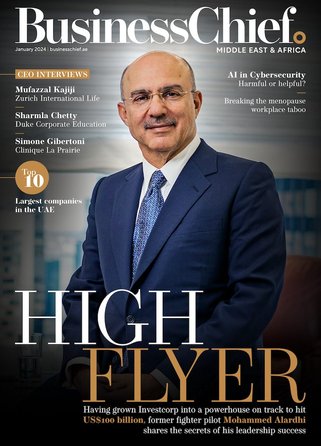Breaking the menopause workplace taboo in the Middle East

Workplace taboos are regularly being broken, from expressing emotions to addressing mental health, yet one remains firmly entrenched in corporate culture – the menopause.
With menopausal women being the fastest-growing workforce demographic, it’s high time organisations addressed the US$150 billion a year economic elephant in the room.
That is the estimated cost of lost productivity due to menopause globally, and while that figure may help to grab shareholder attention, the sad reality is that millions of women leave successful careers every year because they cannot manage symptoms of the menopause, or feel unsupported and misunderstood.
This obviously impacts the organisation as well as those women. If ignored, companies will lose top female talent and have profitability impacted. When properly acknowledged and addressed, they will retain experienced executives and find it easier to attract talent.
Menopause is estimated to affect one billion women globally. When you consider that an independent survey by Opinium, commissioned by Vodafone, found that 62% of those experiencing menopause symptoms said it impacted them at work, we can begin to understand the scale of the support required.
Not only that, 94% of women say they would benefit from wider society being more open to discussing menopause, according to Gen M’s Invisibility Report.
So how are companies in the Middle East responding? For starters, they are changing the very definition of the term ‘menopause’ in Arabic from ‘age of despair’ to ‘age of renewal’.
“Menopause shouldn’t be a taboo subject and should be encouraged to be discussed openly in the workplace,” says Cheryl Thornton, C-Suite HR and member of the Chartered Institute of Personnel and Development (CIPD) Middle East Advisory Committee.
“A few simple changes to the working environment can make a world of difference. Women with menopause need to know their employer has their back, giving them the right support at the right time to reach their full potential.”
Thornton tells Business Chief there has been an encouraging increase in international best practice brought to the region by companies such as Standard Chartered Bank, Hewlett Packard, Accenture, and global law firm Dentons.
Dentons announced its commitment to becoming a menopause-friendly employer in 2023, and strives to be an inclusive employer that ensures all of its people feel supported and encouraged to excel in their role.
“We are particularly keen to improve women's representation in senior positions across the firm and, given the data that 1 in 4 women will consider leaving the workplace because of menopause symptoms, it is imperative that we act now in a proactive way,” says Yvonne Burke-Garricks, Head of Talent Development for UK, Ireland and Middle East at Dentons.
“In addition to improving health and wellbeing, we know that employers with menopause policies and an open and supportive culture are more likely to retain their staff and increase engagement, motivation and productivity.”
Dentons has a comprehensive policy outlining its commitment to supporting everyone who may be impacted by the menopause, not just the person experiencing symptoms. This may include line managers, colleagues, friends and family.
“We have trained menopause mentors, regular talks and drop-in sessions, guest expert speakers for World Menopause Day, access to a dedicated hub containing online resources, a number of bestselling books to borrow, and a comprehensive Employee Assistance Program (EAP) including coaching and CBT treatment,” Burke-Garricks tells Business Chief.
“Although symptoms are consistent across geographies, we are training two people in the Middle East to become menopause mentors who understand the cultural norms across the region and are able to speak to staff in Arabic.”
Menopause part of the wellbeing agenda
With over three decades of international experience in the health and fitness industry, Menopause Coach and Corporate Educator Sharon James has developed a specialised focus on working with women and men to provide a comprehensive understanding of menopause.
She says it has taken considerable effort to bring the topic of menopause to the forefront of public discourse, but the culmination of years of work is slowly having a positive outcome.
“In the past year, I have successfully engaged with multinational organisations, persuading them to incorporate menopause-related initiatives into their overall wellbeing agendas,” says James.
“I think as mental health is being normalised and the whole wellbeing in the workplace has come to fruition, especially within the last year, menopause needs to be included.”
James adds that the Middle East region still has work to do, particularly with regard to local companies and communities.
Thornton agrees, saying that there is still a strong stigma attached to discussing women’s health, including menopause in the workplace.
The best advice Thornton shares is for companies to recognise when support is needed by women with menopause and facilitate open conversations about what symptoms they are experiencing. Menopause shouldn’t be a taboo, and everyone should feel confident to have a conversation with their line manager, or HR, or with someone in their company, especially when they need guidance and advice.
“To normalise the conversation it is important first to break down the invisible barriers which exist in the workplace and wider community,” says Thornton. “The stigma attached to menopause needs to be removed through creating an ecosystem of ongoing opportunities for older women in the workplace. This includes such things as leadership development, promotions, succession, training, and career pathways.”
Dentons runs specific sessions for its teams in the region and encourages everyone to attend, especially male line managers.
Garricks says that, as with all health conditions, increased awareness leads to better understanding and support. Books, posters and Arabic-speaking mentors ensure that everyone has access to medically approved, accurate and relevant advice and guidance.
Understanding the impact
All women will go through the menopause at some point, some much earlier than others, and some will have more severe symptoms than others, so understanding the impact of the menopause in the workplace is important.
This is especially so with women of menopausal age being the fastest-growing workplace demographic in the GCC. These women are usually seasoned leaders with extensive career experience and often act as role models and mentors, especially to Millennials.
Thornton points to a 2022 survey from Biote that says 4 in 10 women experienced menopause symptoms that interfered with their work performance or productivity on a weekly basis, while a further 17% have resigned or considered such a move due to menopause symptoms.
“Supporting women with menopause is vital to leading successful teams and building diversity and inclusion in the workplace, which leads to greater innovation,” says Thornton. “Without the right ecosystem to support women, they are often unable to reach their full potential, hence the compelling need to protect this talent.”
This is in everyone’s best interest. Reports have shown that women are also less likely to apply for promotions because of the menopause, creating a skill gap especially in more senior positions.
“Change is needed to tackle these barriers and understand how better to support women in every stage of their careers,” says James.
“The challenge of attracting and retaining talent is faced by companies worldwide. Hiring new people is a time-consuming process, plus the cost of attrition is eye-wateringly high. Studies claim it costs upwards of a year’s salary to replace someone, with that amount rising significantly for C-suites.”
The benefits for the organisation are clear, yet many are still not making the changes required to have a sensible, open discussion around menopause.
James says these changes do not have to be drastic changes to policies – even simple, small steps can make a difference.
“Women feeling they have support and someone to talk to can make the difference to a woman thriving not surviving,” she says.
The CIPD has been openly discussing menopause in the region for some time now and it is also actively calling on employers to lead the way for change.
“GCC countries have understood the importance of female participation in the workplace to drive economic growth, which is the first step towards progress,” says Thornton.
“Shifting mindsets on menopause starts with reframing the conversation from being ‘women’s issues’ to economic, societal, and business issues.”
Featured Articles
SAP has announced it has appointed a new President for a newly-created EMEA region, aiming to make the most of the opportunities of cloud and AI
technology
From fighter pilot to fashion house financier, Mohammed Alardhi has taken Investcorp to great heights – so what’s the secret to his success?
Dr Omar Al-Attas, Head of Environmental Protection and Regeneration at Red Sea Global, shares his COP28 hopes and approach to regenerative tourism
strategy




